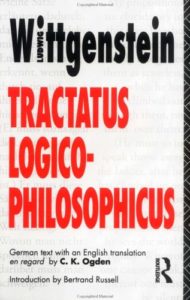 I don’t often admit defeat when I’m reading. I tend to slog away to the end of a book, even if I’m not enjoying it much. Partly this is stubbornness, partly pride, but partly also a belief that most books contain something worthwhile.
I don’t often admit defeat when I’m reading. I tend to slog away to the end of a book, even if I’m not enjoying it much. Partly this is stubbornness, partly pride, but partly also a belief that most books contain something worthwhile.
Recently, though, I had to admit defeat. More specifically, I had to admit that although I was halfway through Wittgenstein’s Tractatus Logico-Philosophicus, I had absolutely no idea what it was about. I mean, I’d read the words and they’d seemed like sentences, but the result was always something either patently obvious or completely senseless. It wasn’t even that I got some parts and not others – I just didn’t get the book at all.
Since this is apparently one of the key philosophical texts of the 20th century, I’m perfectly happy to admit that the fault is mine, not Wittgenstein’s. Perhaps you need more of a background in philosophy to understand what he’s referring to. Or perhaps you just need to be cleverer than I am. In any case, I gave up.
Click here to read my reviews of books I did finish. Or click here to read other people’s reviews of Tractatus Logico-Philosophicus on Amazon.
To mitigate my sense of sadness at giving up on this book, I thought I’d write about it and ask if anyone else wants to share. What book have you given up on? Or do you always read to the end? And by the way, if anyone can shed any light on what Wittgenstein is talking about and how to understand it, do let me know!



There are 3 comments
I am very much like you in that I rarely give up on a book and if I do I usually come back to it later and most of the time find a hook and finish it. The book I gave up on and frankly may never return to is another philosophy text:Twilight of the Idols by Friedrich Nietzsche. I read this for a class and didn’t get far. The discussions were interesting enough but I wanted to understand. I couldn’t grasp where he stood on any thing. Just when I though I understood and could make an intelligent contribution the professor came back with a seeming contradiction to counter my observation. I was grateful I wasn’t required to write about Nietzsche because frankly I didn’t get it.
I really enjoyed reading the interview that was posted on goodreads. It was very interesting. I was glad to hear you’re done with book 2 and working on 3. I saved you’re article on the soul of socialism and look forward to reading it soon. I’ll let you know what I think.
Honestly, I believe like you that all books are intrinsically valuable. But with these kinds of philosophy, it’s not you. They are often written in a quite convoluted language and high-end verbiage which obscures meaning. Fine for those who enjoy this but I have long beleived that life is too short to read a book you aren’t getting much out of or simply dislike. Too many books too little time. I move on.
Sarah
Thanks for the comments – glad to know I’m not alone!
Yeah, Charles, Nietzsche is another tricky one. I read Thus Spake Zarathustra when I was younger, but had very little idea what was going on at the time, and couldn’t tell you a thing about it now. Good to hear you enjoyed the Goodreads interview!
Hi Sarah! Yes, definitely convoluted as far as I’m concerned. I do still have this feeling that I’m missing out on something, but you’re right, there are certainly plenty more books out there.